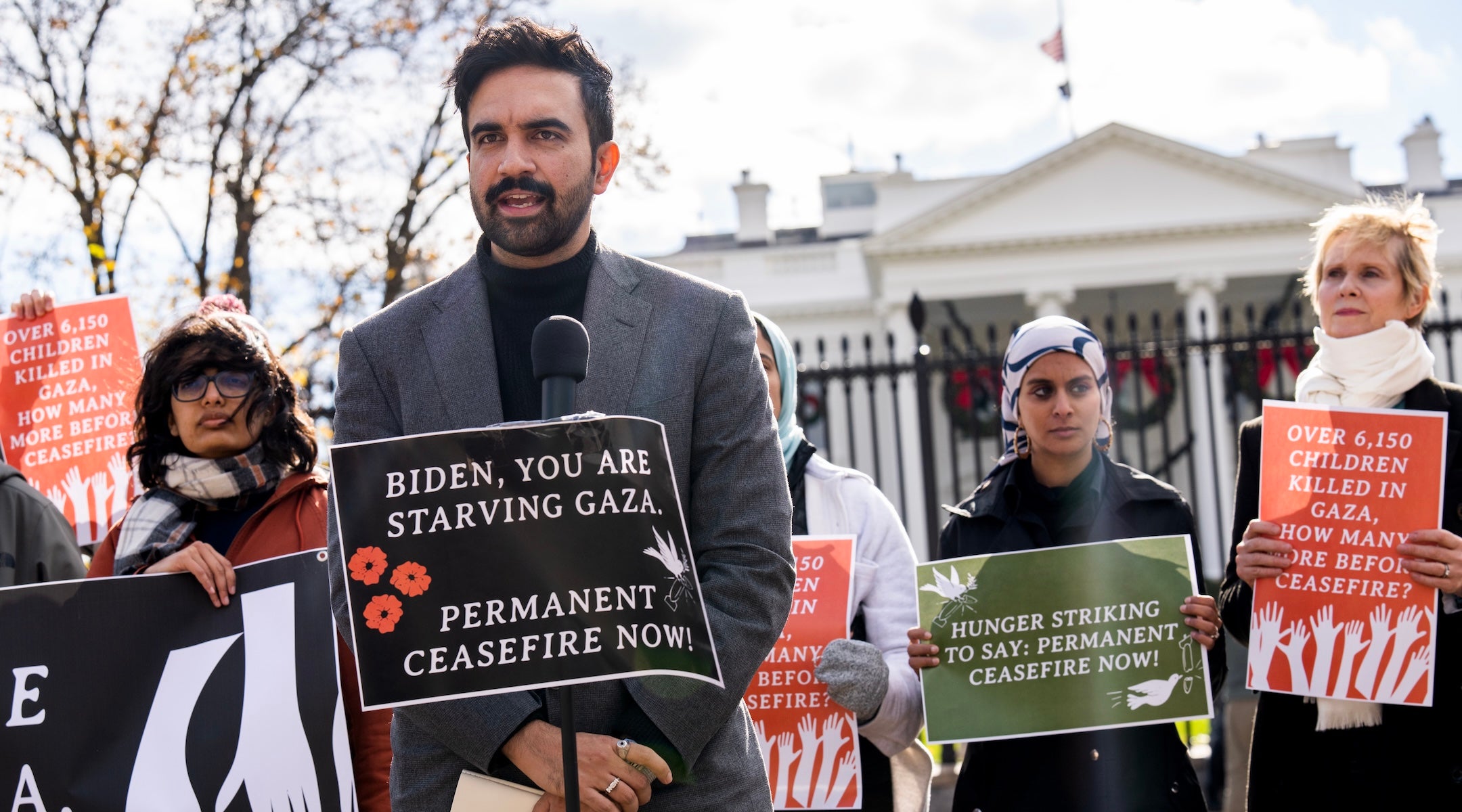In May 2023, a member of the New York State Assembly introduced a bill aimed at blocking nonprofits from funding Israeli settlements in the West Bank. It was swiftly rebuked by his colleagues and never came to a vote.
That bill was called “Not on our dime!: Ending New York funding of Israeli settler violence act,” and the assemblymember was democratic socialist Zohran Mamdani. Now, Mamdani is an emblem of shifting sentiments against Israel — among New Yorkers and Americans nationwide — as he verges on being elected the mayor of New York City.
While “Not On Our Dime” had a short run in Albany, its specter has loomed large over the mayor’s race, particularly for Jewish New Yorkers who are wary of Mamdani because of his attitudes about Israel. Over 1,150 rabbis nationwide, including hundreds in New York City, have signed a letter warning that Jews would be stripped of their “safety and dignity” if anti-Zionism is “normalized” in the city’s halls of power.
Mamdani told the Jewish Telegraphic Agency in a questionnaire last week that he would prioritize his local affordability agenda as mayor. But he also did not reject the idea of enacting “Not On Our Dime”-style legislation in New York City.
“Charities and nonprofits that receive a taxpayer subsidy should not support the violation of international law, and that’s what the right-wing Israeli settlement project is doing,” said Mamdani. “An effort that goes against the stated foreign policy of our own government, going back several decades.”
Here is what “Not On Our Dime” actually said, what its supporters and critics argued, and what its implications could be for New York City under Mamdani.
What the legislation said
“Not On Our Dime” proposed amending the state’s nonprofit law to “prohibit not-for-profit corporations from engaging in unauthorized support of Israeli settlement activity.” Mamdani said it would stop the flow of about $60 million a year from New York-based charities to settlements deemed illegal under international law.
The bill defined “unauthorized support for Israeli settlement activity” as “aiding and abetting” any violation of the 1949 Geneva Conventions by Israel or its citizens. According to the bill, this included the illegal transfer of Israelis into “occupied territory” (defined as the West Bank and East Jerusalem), acts of violence against people living in occupied territory, forced eviction and the seizure or destruction of Palestinian land or property. Mamdani did not tell (JEWISH REVIEW) whether he believed that “unauthorized support” should extend to humanitarian aid for Israelis in the relevant areas.
The bill said nonprofits that spent at least $1 million in violation could be sued, fined by the state attorney general and lose their tax-exempt status. Palestinians and others who said they were harmed by a violation would also be allowed to sue the nonprofits.
“Not On Our Dime” was co-sponsored by four other democratic socialists in the Assembly — Sarahana Shrestha, Phara Souffrant Forrest, Marcela Mitaynes and Emily Gallagher — along with the New York chapter of the Democratic Socialists of America. It emerged from a campaign from left-leaning nonprofits such as the Center for Constitutional Rights, the US Campaign for Palestinian Rights, the Adalah Justice Project and Jewish Voice for Peace.
The groups said on a website for the campaign that they believed nonprofits supporting Israeli settlements should be shut down. “This pioneering legislation makes explicit what is implicit–that a certain class of activities are fundamentally inconsistent with a charitable purpose, and should therefore subject an organization to dissolution,” the website said.
Mamdani told the Jewish Press, an Orthodox newspaper in New York, that he had met with those groups before proposing the legislation, which was accompanied by a state Senate version sponsored by DSA member Jabari Brisport. He also said he viewed the legislation as unlikely to prevail — but crucial to raising awareness about an important issue.
“I believe the attorney general has the jurisdiction now to pursue measures of accountability with regards to these organizations. The likelihood of that is minimal and I think that’s why there is the necessity for this legislation,” he told the newspaper at the time. “I’m under no illusion about the long journey that this legislation has to travel on. I do believe it is a critical first step to even inform New Yorkers.”
There was no precedent for a law that sought to block U.S. charities from funding Israeli settlements. Several states, including New York, have passed measures that took an opposite stance on the Israeli-Palestinian conflict by punishing organizations that boycotted Israel.
Andrew Cuomo, Mamdani’s closest competitor in the mayoral race who is running as an independent, enacted one of these policies as the governor of New York. In 2016, he passed an executive order that banned state agencies from investing in companies and organizations that promoted or engaged in the Boycott, Divestment and Sanctions movement against Israel.
Mamdani has long supported that movement, which calls for government measures to pressure Israel into withdrawing from the West Bank and granting full equality to Palestinians.
What happened when it was introduced
The legislation sparked a surge of energy among pro-Palestinian activists, with over 500 people marching in support in New York City. In Albany, Mamdani announced the bill together with pro-Palestinian activists including Rosalind Petchesky, a retired political scientist who would later feature prominently in his mayoral campaign.
Petchesky, a member of Jewish Voice for Peace, told the press that “Jews are not a monolith.” She added, “We do not all support the state of Israel, we are not all Zionists, many take the position of supporting Palestinians and Palestinian human rights.”
But in the state government, backlash was quick. Democratic Assemblymembers Nily Rozic and Daniel Rosenthal — who are both Jewish, with Rosenthal since leaving for a position at UJA-Federation of New York — denounced “Not On Our Dime” in an open letter signed by 25 lawmakers. They said the bill was “a ploy to demonize Jewish charities with connections to Israel” that would “further sow divisions within the Democratic Party.”
Their letter did not mention Israeli settlements, but said that “Not On Our Dime” sought to attack Jewish groups with “missions from feeding the poor to providing emergency medical care for victims of terrorism to clothing orphans.”
Assembly Speaker Carl Heastie told the Forward the bill was a “non-starter,” and it did not advance. (Two years later, Heastie endorsed Mamdani for mayor in September.)
Meanwhile, all 48 Assembly Republicans denounced the bill as “utterly vicious” in their own joint letter. “This bill seeks to penalize non-profit entities that have any affiliation with the state of Israel and is effectively an attack on Jews and Israel,” they wrote. “As Americans, we find this bill to be not only discriminatory but also deeply anti-Semitic.”
What the bill’s advocates said
Supporters of the legislation said it would cut off a major source of funding for organizations that push Palestinians out of their homes and support violent extremists. Between 2009 and 2013, private donors sent over $220 million to West Bank settlements through about 50 tax-exempt nonprofits, according to a 2015 investigation by Haaretz.
“Aiding and abetting war crimes is not charitable, period,” said Vince Warren, director of the Center for Constitutional Rights, which backed the bill, in 2023. “This bill goes a long way toward ensuring that New York is not inadvertently subsidizing war crimes, but rather creating paths for accountability.”
Mamdani and other advocates rejected the idea that the bill would constrain appropriate charitable work. “Organizations, including Jewish organizations that feed the poor, provide emergency medical care and clothe orphans take up noble causes for which New York state should provide the benefits of charitable status,” he told the Jewish Press at the time. “This is why the bill does not apply to such groups. The rhetorical tactics employed by this letter to suggest otherwise is an attempt to avoid the issue at hand: settlements.”
Mamdani and his co-sponsors relaunched “Not On Our Dime” in May 2024 as Israel and Hamas battled in Gaza, saying they would revise the bill to prohibit “aiding and abetting” Israeli resettlement of Gaza and “unauthorized support” for Israeli military actions that broke international law. Mamdani said he believed the bill had a better chance then, as it reflected “newfound consciousness in our country with regards to the urgency of Palestinian human rights.”
In fact, “Not On Our Dime” had no better prospects in Albany — but it gained traction on the national stage. Rep. Alexandria Ocasio-Cortez, the progressive star who represents the Bronx and Queens but rarely steps into state politics, gave the bill her endorsement.
“It is more important now than ever to hold the Netanyahu government accountable for endorsing and, in fact, supporting some of this settler violence that prevents a lasting peace,” said Ocasio-Cortez at the time. Her backing, a year before she would endorse Mamdani for mayor, signaled the rising crescendo of a left wing animated by criticism of Israel’s treatment of Palestinians.
What the bill’s critics said
Critics said the bill would punish Jewish organizations that provide a range of humanitarian services internationally, including to people living in East Jerusalem and the West Bank.
Sara Forman, who leads the pro-Israel group New York Solidarity Network, called it “antisemitic and unconstitutional state-level nonsensical legislation.”
“This bogus bill, which is extremely vague, would force Jewish charities to quadruple check every penny and every cause related to Israel, tie up their time, cast suspicion on all their work, and stifle critical dollars dedicated to meaningful causes in Israel and the United States, from education to anti-poverty efforts,” Forman said in 2024.
Even some people who partly share Mamdani’s critique of the settlement movement and the Israeli government said the bill went too far.
Rabbi Jill Jacobs, head of the rabbinic human rights organization T’ruah, has herself attempted to block U.S. funding to the most violent Israeli settler groups. Since 2016, T’ruah has filed complaints with the IRS about nonprofits like the Central Fund of Israel, which funnels millions in tax-exempt donations to Israeli groups that fund militant Jewish supremacists. T’ruah’s reasoning was that leaders of these extremist organizations have been indicted or convicted of terrorism in Israel, and U.S. law prohibits sending tax-exempt donations to terrorist groups.
Mamdani specifically mentioned the Manhattan-based Central Fund of Israel during his 2023 press circuit for “Not On Our Dime.” But Jacobs opposed the bill, even as her own efforts failed to stop the flow of money to extremist groups. She said it was too broad, allowing for the possibility of targeting nonprofits beyond terrorists and groups directly involved in building settlements.
“Because of the vagueness of the language, it could potentially be construed to relate to any nonprofit that is putting the baseline of $1 million into settlements,” Jacobs said in an interview. “It could include a group that’s doing support for victims of terror, and a large percentage of them might be living over the Green Line. It could be construed to include American Friends of Hebrew University, because that’s in East Jerusalem.”
In criticizing the legislation, Jacobs referenced the Talmudic idiom “tafasta meruba lo tafasta” — or, “if you grasped too much, you did not grasp anything.”
What “Not On Our Dime” means for a Mayor Mamdani
New York City mayors have long endeavored to show support for Israel, dating back even before it became a state in 1948. In 1923, Mayor John Hylan called on New Yorkers to contribute “generous support” to a fund for building a Jewish homeland in Palestine. Then as now, the city had the largest Jewish population in the world.
But this year, the mayor’s race overlapped with a war that sent opinions of Israel in the United States plunging to new lows, with images of dying Palestinian children and destruction spreading across social media and protesters, including many American Jews and New Yorkers, rallying against Israel’s campaign in Gaza.
Mamdani surged in that context, winning the Democratic mayoral nomination and rocketing to fame at the same time as Israel drew its sharpest and most widespread criticism. The timing was right for Mamdani, who is 34 and formed his political identity as a young man around a cause that had never before found a champion in Gracie Mansion: Palestinian rights and independence.
He has pledged to take some actions locally to advance those views, including arresting Prime Minister Benjamin Netanyahu if the Israeli leader sets foot in New York City, not investing the city’s pension funds in Israel bonds and dismantling a New York-Israel economic cooperation initiative.
Mamdani has not said he would propose legislation comparable to “Not On Our Dime” as mayor. Still, some New Yorkers concerned about his stances on Israel are asking if he would attempt a city-level version of the bill — and how that would affect their lives.
In August, a caller to WNYC’s “Brian Lehrer Show” asked whether such legislation would penalize their synagogue for donating to Jewish emergency response groups that operate globally, including in East Jerusalem and the West Bank. In an on-air interview, Lehrer relayed this question to Mamdani, who brushed off the concern.
Jacobs said that outcome would be unlikely under the legislation as it was written, given its $1 million threshold.
“I guess if there were a synagogue that was raising $1 million for a settlement, then if this bill had passed, maybe it would say that synagogue couldn’t do that. But I don’t know if that is a situation that actually exists,” she said.
Jeremy Cohan, a leader in the New York City chapter of Democratic Socialists of America, is part of the Jewish left that has strengthened Mamdani’s rise. In his own interview with Lehrer in October, Cohan articulated his understanding of “Not On Our Dime” and why he believed it would resonate with New York City voters.
“The ‘Not On Our Dime’ bill was designed to say, ‘Hey, if you’re committing violations of international law, if you’re funneling money to organizations that are committing violations of international law, that are aiming to dispossess people of their land illegally, that are complicit in war crimes, we are going to not subsidize that as New York State. New York State stands for something. We don’t stand for war crimes,’” he said.
“I do think that so much of the choice, or a decent part of the choice, facing New Yorkers is, do New Yorkers want a mayor who takes war crimes seriously, or do they want a mayor like Andrew Cuomo who defends war crimes and genocide,” Cohan continued. “I think they want a mayor who opposes war crimes and prioritizes their interests, which Zohran Mamdani will do.”
“Not On Our Dime” shows Mamdani is a politician with a track record of taking action on his beliefs, whether or not he believes he will quickly effect change. And in his victory speech after the Democratic primary, he identified himself as one of “millions of New Yorkers who have strong feelings about what happens overseas.”
He acknowledged that many in the city disagreed with his ideas and said he would seek to understand their perspectives. But in a sign of how he would hold to his views of Israel and Palestine as the mayor of New York City, he said, “I will not abandon my beliefs or my commitments grounded in a demand for equality, for humanity, for all those who walk this earth.”
Keep Jewish Stories in Focus.
(JEWISH REVIEW) has documented Jewish history in real-time for over a century. Keep our journalism strong by joining us in supporting independent, award-winning reporting.




